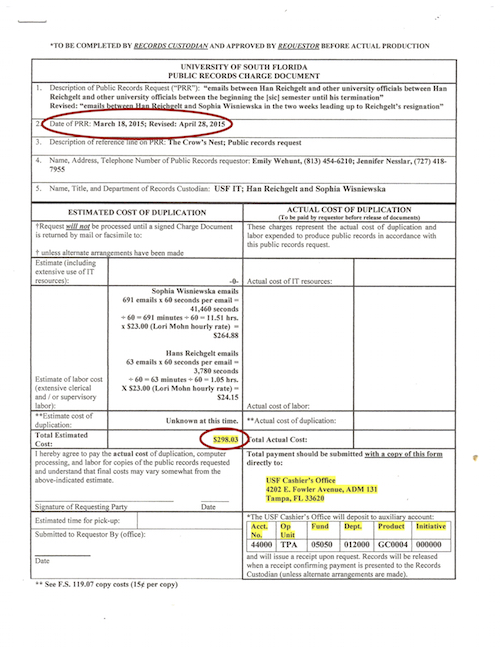The university’s top academic administrator was ousted 14 months ago after a complaint that involved USF’s Office of Diversity, Inclusion and Equal Opportunity.
The sudden departure of Han Reichgelt, the regional vice chancellor of academic affairs, on Feb. 27, 2015, has been carefully managed by university officials, who for months have declined to discuss it.

Han Reichgelt resigned his high-profile post after just eight months.
But emails obtained by the Crow’s Nest last week under Florida’s Public Records Law show that an unnamed complainant and the complainant’s attorney – also not named – were being consulted by Gerard D. Solis, then the university’s deputy general counsel.
It took the university 13 months to supply public records requested by the Crow’s Nest shortly after Han Reichgelt was dismissed. See story below.
The evening before Reichgelt’s departure was announced, the university’s media and public affairs manager in Tampa emailed top campus officials in St. Petersburg to recommend that Regional Chancellor Sophia Wisniewska not provide a statement to the news media.
“Reporters can pull a quote from the Regional Chancellor’s letter to faculty/staff if they would like to include a quote from her,” wrote Lara Wade.
The complainant’s name should be redacted from public records and remain confidential, Wade wrote.
“I spoke with Gerard (Solis) and he will talk to the complainant’s attorney,” she wrote. “Gerard will recommend that the complainant not speak with reporters – he believes the attorney will agree with this advice.”
Reichgelt had been in his high-profile post for only eight months when Wisniewska announced that he had resigned, “effective immediately.”
In an exchange of letters released by the university, Reichgelt wrote that he was “no longer confident that I can serve you and this wonderful institution with the level of quality that you and the institution deserve.”
Wisniewska replied that his resignation was “in the best interest of this institution.”
She told him he would be transferred to a teaching post in the College of Business, and she directed him to “complete appropriate training as identified by the Office of Diversity, Inclusion and Equal Opportunity.” That training, she added, “is to be completed off campus.”
Reichgelt is now a professor of information systems management. He is teaching online courses this semester and is scheduled to teach more this fall.
In the past, he has declined to comment about his departure. He did not return phone messages over the weekend.
The emails obtained by the Crow’s Nest – 13 months after requesting them under the Public Records Law – show that Solis drafted two options for Wisniewska’s letter to Reichgelt.
“My expectation is that the second template will be likely be used (sic) given Dr. Reichgelt’s stated intention to resign,” Solis wrote.
Solis also drafted the letter that Wisniewska sent to faculty and staff to announce Reichgelt’s departure.
The emails show that university officials briefly explored the possibility of filling Reichgelt’s position with the candidate who was runner-up to him in the selection process.
“Since it has been less than a year, are we able to reach into the pool and offer the other strong candidate the position of Regional Vice Chancellor for Academic Affairs?” asked Chitra Iyer, regional associate vice chancellor for administration, in an email to Solis and Jose Hernandez, the university’s chief diversity officer and Title IX coordinator in Tampa. “If we have passed the time frame within which to do that, is there a possibility to obtain an extension of that time frame?”
“I have not seen anything that prohibits or permits this, but I will keep checking,” Solis replied.
Psychology professor Mark Durand, who was regional vice chancellor of academic affairs in 2005-2007, has been interim vice chancellor since Reichgelt’s departure.
Full story of dismissal still a mystery
In a faculty survey last spring, Regional Chancellor Sophia Wisniewska drew pointed criticism from two professors for the way she handled the sudden departure of the campus’ top academic administrator in February 2015.
The professors skewered her for not explaining why Han Reichgelt, the regional vice chancellor of academic affairs, was ousted just eight months after he was hired.
“The firing of the RVCAA was handled very poorly,” wrote one professor in the comments section of the survey. “We demand an explanation as to what happened.”
“I am still unclear as to the firing of the RVCAA,” the second professor wrote. “The lack of communication only raises more questions and suspicions.”
Like all comments in the survey, their observations were anonymous.
Now, more than a year after Reichgelt was dismissed, the full story of his departure remains a mystery.
Wisniewska and top assistants have declined to discuss it, saying the university does not discuss personnel issues. Reichgelt, who now teaches online courses in the College of Business, has also declined to comment.
More than 1,600 pages of emails to and from Wisniewska and Reichgelt in the two weeks leading up to his resignation were released to the Crow’s Nest last week under Florida’s Public Records Law.

They reveal that he was ousted after a complaint that involved USF’s Office of Diversity, Inclusion and Equal Opportunity. But the complainant is not named and the particulars of the complaint are not spelled out.
The Public Records Law has been in the Florida statutes since 1909, and it is one of the most sweeping records laws in the country. But it took more than a year for the newspaper to obtain the emails.
On March 18, 2015, three weeks after Reichgelt’s abrupt resignation, the Crow’s Nest made a request under the Public Records Law for copies of the email correspondence between Reichgelt and other university officials from the beginning of that semester until his termination.
It revised the request on April 28, 2015, seeking only the emails between Reichgelt and Wisniewska in the two weeks before his departure.
In the months that followed, the newspaper repeatedly inquired about the status of the request and then the status of its payment to cover the cost of reviewing and producing the emails.
On Feb. 16, 2016, Lori Mohn McNenney, legal administrative specialist for Gerard D. Solis, USF’s general counsel, advised that it would take an estimated 11.51 hours to review Wisniewska’s 691 emails and black out any material that was exempt from disclosure under the Public Records Law.
At her hourly rate of $23, she said, the cost would be $264.88.
McNenney also estimated that the cost of reviewing Reichgelt’s 63 emails would be $24.15.
After receiving the estimate on Feb. 18, the Crow’s Nest quickly agreed to pay the total estimated cost of $298.03 and submitted the necessary paperwork on Feb. 19. But it took weeks to get the payment processed through the Office of Student Life and Engagement in St. Petersburg and the USF cashier’s office in Tampa.
The payment was not received until March 30, according to McNenney.
On April 4, Samantha Putterman, the Crow’s Nest editor-in-chief, wrote university officials to complain that the university was dragging its feet on the public records request.
“We have inquired – repeatedly – about the status of the request and then the status of our payment, both of which have languished in the university bureaucracy,” she wrote.
“In reply, we have gotten vague promises and stalling.
“Chapter 119.07 of the Florida Statutes is clear: Public records custodians must respond to requests in ‘reasonable time, under reasonable conditions.’
“To quote Florida’s First Amendment Foundation, the ‘Public Records Act requires the (government) agency to acknowledge requests promptly and respond in good faith.’
“Furthermore, case law has established that unreasonable delay is the equivalent of refusal to comply with the law.
“The university has not responded in good faith. Its delays are unreasonable. Its representatives have chosen to drag this out in the hope that we will abandon our request. We will not.
“By this letter, we renew our request for you to obey the law and promptly supply the records.”
The university released the records on April 15.


